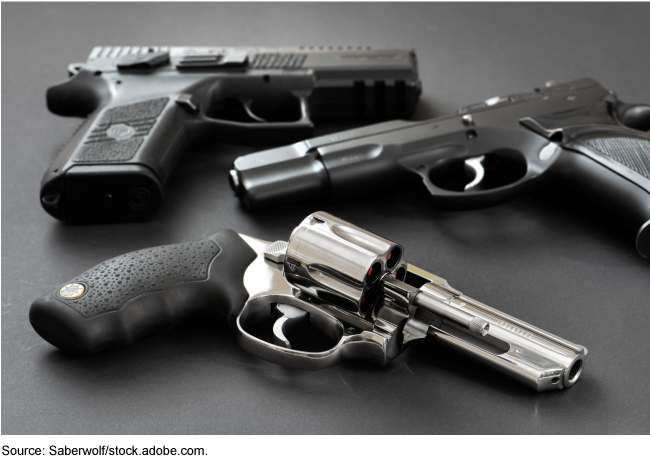Caribbean Firearms: Agencies Have Anti-Trafficking Efforts in Place, But State Could Better Assess Activities
Fast Facts
Caribbean countries accounted for 6 of the world's 10 highest murder rates, according to the United Nations.
Caribbean law enforcement asked the U.S. to trace 7,399 guns recovered in crimes from 2018 to 2022. About three-fourths came from the U.S.
U.S. agencies have a variety of programs to help improve law enforcement, such as the Caribbean Basin Security Initiative, a U.S. partnership with 13 countries. The State Department tracks results from the program but doesn't specifically track gun trafficking results. We recommended that it do so.

Highlights
What GAO Found
The majority of recovered firearms in the Caribbean were traced to the U.S. and trafficked through various means. The Department of Justice's Bureau of Alcohol, Tobacco, Firearms and Explosives (ATF) traces the origin of firearms recovered in Caribbean countries at the request of Caribbean law enforcement agencies or ATF officials in the Caribbean. While the political will and capacity of each country impacts the number of recovered firearms each country submits for tracing, ATF processed 7,399 traces of firearms recovered in crimes in the Caribbean from 2018 through 2022 (see figure). GAO analysis of these data showed that 73 percent of these firearms, most of which were handguns, were sourced from the U.S. While Caribbean countries do not manufacture firearms, U.S. and foreign officials said that criminals in Caribbean countries can traffic firearms by air and sea using various concealment techniques and can obtain firearms through illegal markets.
Origin of Caribbean Firearms Recovered and Traced by ATF, 2018-2022
|
Firearms origin |
Total |
Percentage |
|---|---|---|
|
U.S. origin |
5,399 |
73% |
|
Non-U.S. origin |
1,728 |
23% |
|
Undetermined origin |
272 |
4% |
|
Total firearms recovered and submitted for tracing = 7,399 |
Source: GAO analysis of Alcohol, Tobacco, Firearms and Explosives (ATF) data. | GAO-25-107007
To help disrupt and combat firearms trafficking, the Departments of State, Justice, Homeland Security (DHS), and Commerce have various capacity-building, investigative, and border security efforts in place. For instance, State, working through the Caribbean Basin Security Initiative (CBSI)—a U.S. security partnership with 13 Caribbean countries—helps fund various trainings and capacity building programs, such as the Crime Gun Intelligence Unit. This unit collects and analyzes intelligence on guns and promotes intelligence sharing with regional international law enforcement partners. DHS's Homeland Security Investigations, a law enforcement agency, established Transnational Criminal Investigative Units throughout the Caribbean and conducts various interagency operations to uncover criminal networks responsible for trafficking firearms. DHS's Customs and Border Protection interdicts illicit firearms at U.S. ports of entry enroute to the Caribbean. From fiscal years 2018 through 2023, it conducted hundreds of domestic interdictions, seizing 535 firearms and 3,167 firearm components at U.S. ports destined for Caribbean countries.
U.S. agencies track results of their key efforts to combat firearms trafficking to the Caribbean through various means. However, State does not track results for combatting firearms for the CBSI. Specifically, State's CBSI's Results Framework includes intermediate results and indicators for each program objective but does not have specific indicators for its goal of reducing illicit firearms trafficking. Developing such indicators would better enable State to measure progress of its combating firearms trafficking efforts.
Why GAO Did This Study
Some Caribbean nations, such as Haiti, Jamaica, and Trinidad and Tobago, have high rates of violence, including homicide. In 2021, Caribbean countries accounted for six of the world's 10 highest national murder rates, according to the United Nations Office on Drugs and Crime. The United Nations and other organizations monitoring firearms trafficking have reported that a high percentage of the firearms used in these crimes have been trafficked from the U.S.
GAO was asked to report on U.S. efforts to counter firearms trafficking to Caribbean nations. This report examines (1) what data and reporting show about the trafficking and use of firearms in Caribbean countries; (2) U.S. agencies' efforts to disrupt firearms trafficking in these countries; and (3) agency efforts to track results of key efforts to combat firearms trafficking from the U.S. to the Caribbean.
GAO reviewed federal firearms recovery and trace data, and other related U.S. agency data, analysis, and program information for fiscal years 2018 through 2022, the most recent available at the time of our review. GAO interviewed U.S. and Caribbean officials through in-person site visits in the Bahamas and Trinidad and Tobago, and through video conferences with Barbados, Dominican Republic, Haiti, and Jamaica. GAO selected these countries based on geographic diversity, the percentage of recovered firearms that were of U.S. origin, and U.S. agency efforts in country to combat firearms trafficking.
Recommendations
GAO is recommending that State update the CBSI's Results Framework to establish firearms trafficking specific indicators. State concurred.
Recommendations for Executive Action
| Agency Affected | Recommendation | Status |
|---|---|---|
| Department of State | The Secretary of State should ensure that the Bureau of International Narcotics and Law Enforcement updates the Caribbean Basin Security Initiative's Results Framework to establish firearms trafficking specific indicators. (Recommendation 1) |
In its comments on our report, which was publicly released in November 2024, State concurred with this recommendation. In April 2025, State communicated to us that it had identified several preliminary indicators specific to firearms trafficking and that it planned to identify additional indicators that would align with updated administration priorities on policy and foreign assistance programming. We will provide updated information when we confirm the actions the Department has taken in response to this recommendation.
|
